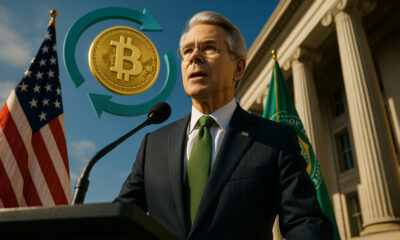Policy & Regulation
Former SEC aide and Uniswap founder clash over decentralization’s true role

Credit : cryptoslate.com

4 days after Uniswap Labs and the Uniswap Basis proposed merging their operations and triggering the long-awaited charge change, an X-feud between the protocol’s founder and Gary Gensler’s former chief of workers reopened wounds the crypto business thought had healed.
The alternate wasn’t nearly a vote on governance, it was a proxy conflict over how Washington and Web3 keep in mind 2022, and whether or not decentralization was ever greater than regulatory theater.
Amanda Fischer, now at Higher Markets after serving as SEC chief of workers beneath Gensler, was the primary to fireplace.
On November 14, she posted that Uniswap’s proposal to consolidate Basis operations into the worthwhile Labs entity whereas redirecting protocol charges to UNI token burns learn:
“This website is filled with posts about Uni’s transfer to centralization as a result of this has by no means been a core philosophical worth, however a regulatory defend.”
Inside hours, Hayden Adams responded:
“You tried at hand over a centralized crypto alternate monopoly within the US to FTX. I constructed the biggest decentralized market on this planet. And he or she says decentralization is not one in all my values? This crash is loopy lmao. Not every thing you learn on Twitter is true Amanda.”
The spirit of SBF’s Washington playbook
Adams’s invocation of FTX was not a rhetorical flourish, however a strategic dig. In October 2022, a month earlier than his inventory market crashed, Sam Bankman-Fried (SBF) revealed “Doable Digital Asset Business Requirements,” a coverage framework that endorsed the licensing of DeFi front-ends and required OFAC sanctions screening.
The proposal provoked an instantaneous backlash from the builders, who noticed it as a give up disguised as a compromise.
The controversy crystallized in a Bankless episode, during which Erik Voorhees accused SBF of “glorifying OFAC” and undermining crypto’s core values.
Bankman-Fried countered that front-end licensing would protect code with out permission whereas appeasing regulators, a distinction that critics discovered pointless as a result of the interfaces have been how most customers accessed protocols.
On the identical time, SBF turned essentially the most distinguished backer of the Digital Commodities Client Safety Act, a laws critics dubbed the “SBF invoice” for its compliance necessities that might basically ban main DeFi providers.
The invoice died together with the implosion of the FTX, however the episode confirmed a story: Bankman-Fried needed to supervise the centralized exchanges, and Washington was prepared to play alongside.
Fischer’s SEC tenure overlaps with this era. Though she has pushed for clear regulation of the Administrative Process Act, her report is unequivocally in favor of enforcement.
In congressional testimony, she argued that crypto can adjust to current securities legal guidelines. In a latest evaluation co-authored by Higher Markets, the present SEC was criticized for “abandoning” its enforcement efforts.
Her philosophical alignment with robust rules makes Adams’ accusation significantly charged.
The speed change that lasted 5 years
The unification proposal represents an actual structural change. Since UNI launched in 2020, Uniswap Labs has operated at arm’s size from the board and has been restricted in the way it can take part in protocol selections.
The speed change remained dormant regardless of repeated makes an attempt, every stalled by authorized uncertainty over whether or not activation would flip UNI right into a safety.
The November 10 proposal, co-authored by Adams, Basis Government Director Devin Walsh, and researcher Kenneth Ng, prompts protocol charges for Uniswap v2 and v3 swimming pools, directs the proceeds to UNI burns and instantly wipes out 100 million UNI from the treasury.
Labs would additionally cease accumulating its personal interface charges, which have totaled $137 million.
The merger brings collectively the Basis’s actions in Labs, creating “one aligned workforce” for protocol growth. Critics see centralization as an obstacle, as a result of fewer entities imply fewer controls.
Proponents see effectivity as a bonus as a result of fewer entities imply quicker execution. UNI rose as much as 50% on the information, earlier than reaching $7.06 on the time of writing.
Fischer’s studying is that decentralization was at all times contingent, maintained when it supplied authorized insulation, and deserted when financial incentives modified.
In accordance with Adams, this transfer represents maturation, the place a protocol that has survived 5 years of regulatory hostility can lastly align worth creation with governance.
What 2022 truly regarded like
The Twister Money sanctions in August 2022 supplied the context to which either side refer. When the Treasury Division’s OFAC authorised the mixer protocol, it was the primary time the code itself was designated.
The motion compelled each DeFi builder to analyze whether or not US customers may legally work together with their protocols and whether or not front-ends have been liable.
The SBF coverage memorandum ended up in precisely that ambiance two months later. His framework acknowledged the brand new actuality: If regulators may sanction protocols, the wrestle for entry turned existential.
His reply, which was about licensing the interfaces, screening customers and preserving code free, struck many as a capitulation to the chokepoint mannequin that crypto sought to avoid.
The choice place, championed by builders like Voorhees and implicitly by Adams, held that any compromise on entry management recreated TradFi’s gatekeeper in Web3 clothes.
In case you front-screen customers, you’ve got already misplaced the sport with out permission.
Uniswap’s place was vital due to its dimension. As the biggest decentralized alternate, now processing greater than $150 billion month-to-month and producing almost $3 billion in charges yearly, its compliance posture units the business up for default.
Why this issues now
The present SEC has withdrawn from crypto enforcement beneath the brand new administration. Fischer’s Higher Markets evaluation explicitly factors to this decline.
For enforcement advocates, the unification of Uniswap is a victory that slips away after regulatory success.
For Adams and the DeFi group, the proposal represents earned autonomy after surviving years of hostile scrutiny that just about categorised UNI as a certainty, creating such profound authorized uncertainty that the speed change remained dormant regardless of the desires of token holders.
The FTX reference is the deepest as a result of it reframes the query of who labored with whom. If SBF’s Washington agenda aligned with the SEC’s preferences, then enforcement-oriented regulators have been the enablers of centralization, not the protectors towards it.
Adams constructed infrastructure with out permission; Bankman-Fried lobbied for acknowledged chokepoints. Considered one of them has survived the regulator’s scrutiny and now prompts worth sharing for token holders. The opposite collapsed on fraud.
Their
The $800 million token burn and 79% likelihood of board approval counsel the market has already chosen its reply.
-

 Meme Coin8 months ago
Meme Coin8 months agoDOGE Sees Massive User Growth: Active Addresses Up 400%
-

 Blockchain1 year ago
Blockchain1 year agoOrbler Partners with Meta Lion to Accelerate Web3 Growth
-

 Videos1 year ago
Videos1 year agoShocking Truth About TRON! TRX Crypto Review & Price Predictions!
-

 NFT11 months ago
NFT11 months agoSEND Arcade launches NFT entry pass for Squad Game Season 2, inspired by Squid Game
-

 Meme Coin1 year ago
Meme Coin1 year agoCrypto Whale Buys the Dip: Accumulates PEPE and ETH
-

 Solana5 months ago
Solana5 months agoSolana Price to Target $200 Amid Bullish Momentum and Staking ETF News?
-

 Videos4 months ago
Videos4 months agoStack Sats by Gaming: 7 Free Bitcoin Apps You Can Download Now
-

 Ethereum1 year ago
Ethereum1 year ago5 signs that the crypto bull run is coming this September













